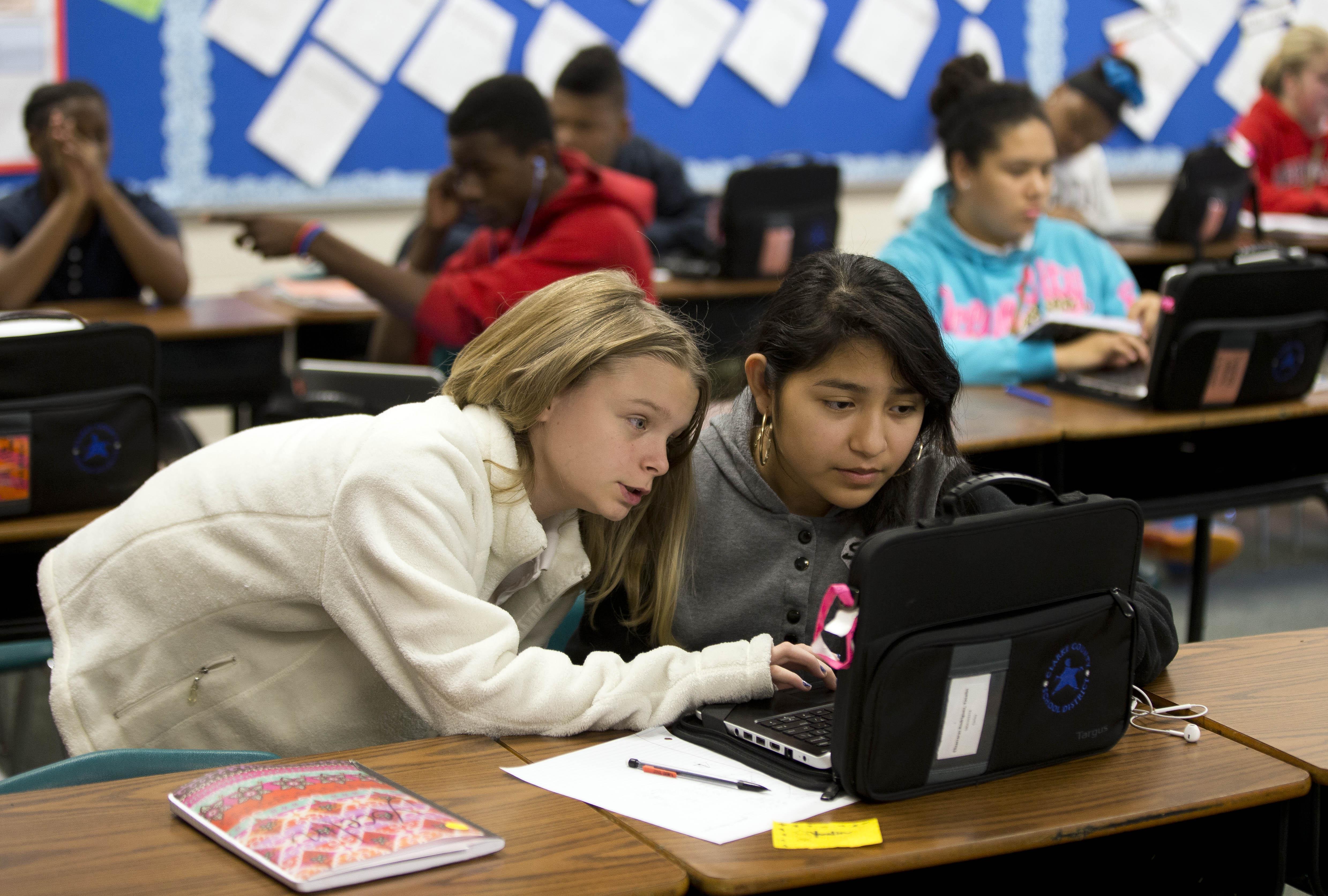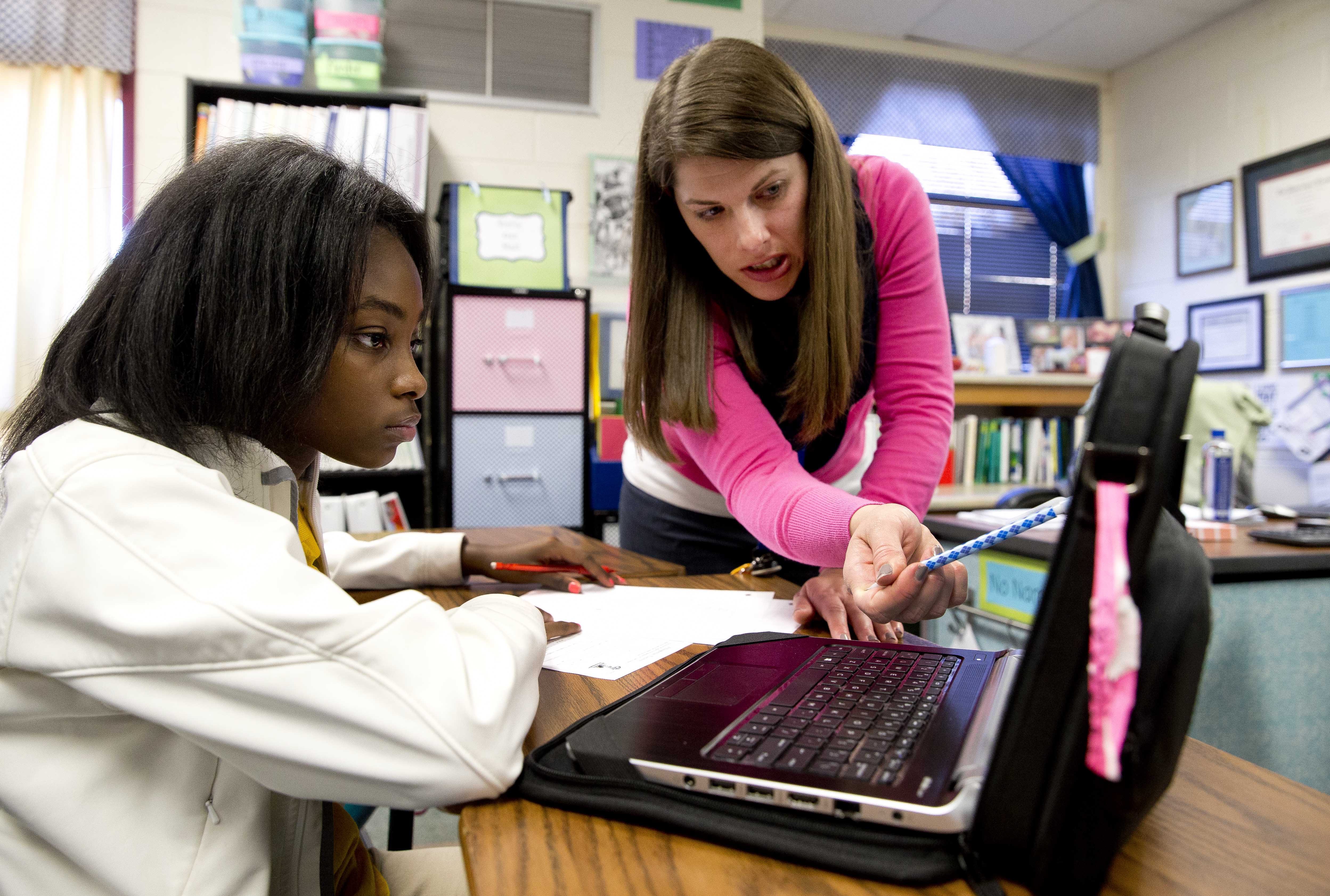 In this Nov. 20, 2014 photo, eighth-graders Alexis Gibbons, left, and Yocelin Rodriguez use a digital textbook to solve a math problem at Burney Harris Lyons Middle School in Athens, Ga. Georgia schools will use only digital textbooks within the next six years under a proposal one state lawmaker has planned for the 2015 session.
In this Nov. 20, 2014 photo, eighth-graders Alexis Gibbons, left, and Yocelin Rodriguez use a digital textbook to solve a math problem at Burney Harris Lyons Middle School in Athens, Ga. Georgia schools will use only digital textbooks within the next six years under a proposal one state lawmaker has planned for the 2015 session.ATHENS, Ga. - Nearly 30 eighth-graders bend over laptops during Karen Farnsworth's Thursday morning math class, raising their hands for help as the teacher moves around pointing to their screens or providing video links.
In the second row, 13-year-old Yocelin Rodriguez glances at a question about finding the height of a shape, before grabbing her pencil and making calculations on a sheet of paper.
The combination, Rodriguez said, helps her learn concepts and then figure out how to solve them. She prefers paper "to think through the process," but likes the videos available on the computer when she's struggling.
All Georgia classrooms will look like Farnsworth's by 2020 if one state lawmaker's proposal makes it through the Legislature this year. State Sen. John Albers, a Roswell Republican, said the details of his bill are still in the works but pledged not to force local school districts to cover all costs of moving to digital materials.
 In this Nov. 20, 2014 photo, eighth-grader Aklya Thomas and teacher Karen Farnsworth use a digital textbook during a math class at Burney Harris Lyons Middle School in Athens, Ga. Georgia schools will use only digital textbooks within the next six years under a proposal one state lawmaker has planned for the 2015 session.
In this Nov. 20, 2014 photo, eighth-grader Aklya Thomas and teacher Karen Farnsworth use a digital textbook during a math class at Burney Harris Lyons Middle School in Athens, Ga. Georgia schools will use only digital textbooks within the next six years under a proposal one state lawmaker has planned for the 2015 session.Educators across the country are moving toward classrooms based around technology, and the Obama administration this week committed more funding to expand high-speed Internet access and pledged to connect 99 percent of students through their school or library.
That could help solve one of the biggest problems for districts adopting digital materials -- access. Students need the material both at school and at home. If a community doesn't have reliable Internet access, making the switch doesn't benefit students equally, said Doug Levin, executive director of the State Educational Technology Director Association.
Albers wants school districts to decide the best way for kids to use those materials. Other states have opted for a variety of laptops or tablets.
Albers said he hopes to introduce the bill early in 2015.
"We need to have a goal," he said. "Technology can prepare our students for the business world, but it's also the great equalizer whether you live in a suburban, urban or rural environment."
Rep. Terry England, chairman of the Georgia House's Appropriations Committee, said he hasn't heard any discussion of how much Albers' proposal would cost or what the state could afford. England said many lawmakers agree digital materials have advantages but district officials will need time to phase out textbooks and upgrade their building technology.
Other states have used the deadline format that Albers has in mind. Florida lawmakers, for example, passed a bill requiring that districts use at least half of their textbook budget on digital materials starting in 2014 and increasing every year. Mary Jane Tappen, the state department of education's executive vice chancellor, said the goal isn't to wipe out all paper or traditional materials but to urge more adoption.
The state faced some challenges along the way, she said. Software tracking students' results on quizzes or exercises had to communicate with existing programs. Florida districts struggled to get more freedom from publishers, moving away from the traditional model of buying textbooks with accompanying CD's.
Administrators at middle Georgia's Clarke County School District made a similar demand of schools -- integrate technology into classrooms by this year. The push was intimidating, Farnsworth said, but she now believes that quizzes, videos and other exercises delivered by laptops helped kids learn as much as pen and paper. It also helps parents get comfortable with new methods for teaching math, the teacher said.
"It makes everyone's life easier, and it engages the kids who wouldn't have been engaged otherwise," she said.
Supporters of adding more digital materials say students need to get accustomed to learning on a screen, not just being entertained. As states develop new exams students will take on a computer, they will be more comfortable if they're learning digitally, too, Levin said.
"For many years we were on autopilot: You always buy a textbook because it's in the budget," Levin said. "Technology is changing people's thinking."
